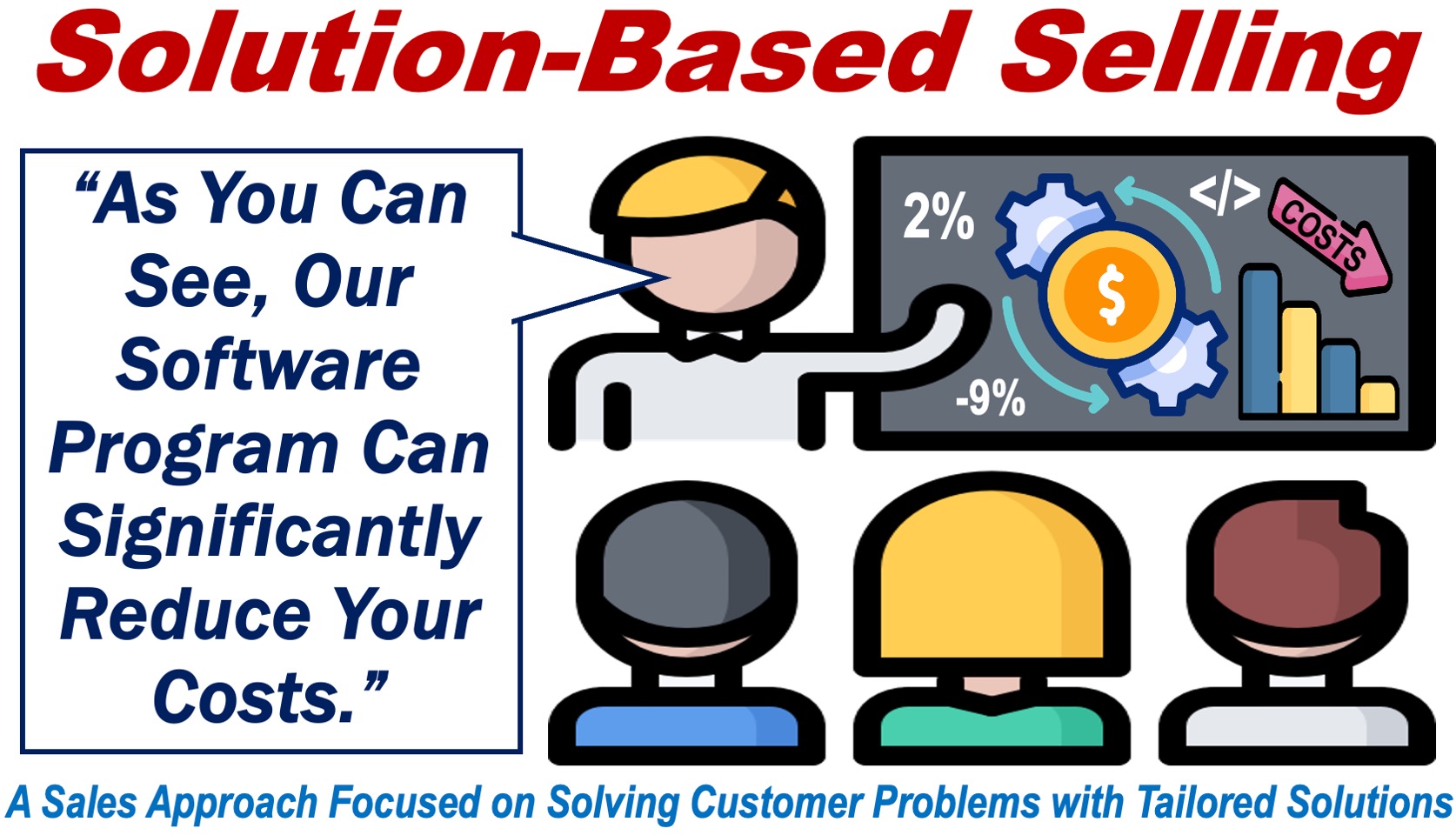In your sales approach, do you focus on identifying and addressing the specific needs or problems of your prospect or customer? If so, you practice Solution-Based Selling or Solution-Based Sales – you are a Solution-Based Seller.
You center on understanding the unique challenges of your *prospect or customer and then offering tailored solutions that meet those needs, unlike those who practice traditional sales methods, which often emphasize the features and benefits of a product.
* A prospect is somebody who you think has a good chance of becoming a paying customer. In this article, when you see the word “prospect,” it also includes “customer” and vice-versa. The same applies to “products” and “services.”
Decisionlink.com has the following definition of decision-based selling:
“Solution-based selling focuses on how the product solves the customer’s problem. Rather than focus on the product, this method of selling is centered around the outcomes of using the product.”
“A solution-based seller takes time to find out what unique issues the prospect is facing, unearthing their root cause and presenting their product as the best tool that solves that problem.”
Solution-Based Selling – Customer’s Situation
As a solution-based seller, you start by finding out as much as you can about your prospect’s situation. You gather and analyze information about their business, *pain points, and objectives.
* Pain points are specific problems or challenges that customers face, which you seek to solve when you present your product.
This information-gathering phase is crucial because it allows you to identify the real issues that your product can solve. Rather than pushing your offering, you are positioning yourself as a problem solver, which builds trust and credibility with your prospect.
Offer a Solution
Once you have a clear understanding of your customer’s needs, the next step is to align your product as the best solution. This involves demonstrating how, what you offer, can address their specific problems.

For example, if you are selling software, you would highlight how your software’s features directly solve the issues your customer is facing, whether it’s improving efficiency, reducing costs, or enhancing customer satisfaction.
Talk About Tangible Benefits
In this type of selling, it’s important to focus on the value that your solution brings to your customer.
This means talking less about the technical details of your product and more about the tangible benefits your customer will experience, such as:
- How will your solution save them time or money?
- How does your product address their specific pain points?
- What makes your solution better than other options available?
- Why should they choose your solution over competitors?
- How will your service improve their overall efficiency?
- What impact will your solution have on their long-term success?
- How can your solution help them overcome current challenges?
- What immediate benefits will they see after implementing your solution?
- How will your solution adapt to their future needs?
- What specific results can they expect from using your product?
By keeping the conversation centered on their needs and the value your solution provides, you create a compelling case for why they should choose your product.
Solution-Based Selling & Collaboration
Collaboration is a key aspect of solution-based selling. Instead of viewing the sales process as a one-way street where you pitch and the customer listens, it’s more effective to engage in a dialogue.
Ask questions, listen to your customer’s concerns carefully and be open to feedback. Do not underestimate the importance of active listening. The world’s most successful salespeople are also very good listeners.
This collaborative approach ensures that the solution you offer is truly tailored to their needs, making it more likely that they will see the value in your proposal and decide to move forward.
Similar Sales Methods to Solution-Based Selling
Solution-based selling shares many principles with other sales approaches that also prioritize understanding and addressing the customer’s needs. Here are ten of them:
Focuses on identifying and solving customer needs, similar to solution-based selling.
Involves understanding customer problems and offering tailored solutions.
Challenges customer assumptions and provides tailored solutions..
Offers insights to redefine customer problems and positions your solution as the answer..
Prioritizes the customer’s needs and provides tailored solutions.
Builds long-term trust by understanding needs and offering solutions.
Aligns solutions with the customer’s broader business goals.
Challenges customer thinking and offers solutions to newly understood problems.
Works closely with the customer to develop tailored solutions.
Personalizes solutions for key accounts, similar to solution-based selling’s focus on tailored solutions.
Solution-Based Selling vs. Solution Selling
Solution-Based Selling and Solution Selling are similar but not identical. Both focus on solving customer problems – they are both client-centric sales methods.
Solution Selling is a specific method with a step-by-step process, while Solution-Based Selling is a broader approach. It’s more about a mindset, focusing on finding and delivering the best solution for the customer, no matter the method used.
Solution Selling is one specific method within the broader category of solution-focused sales approaches, like how a banana is one type of fruit, but not all fruits are bananas.
Final Thoughts
In summary, solution-based selling is about shifting the focus from what you’re selling to why it matters to your customer.
By identifying their problems and what matters to them the most, presenting your product as a tailored solution, and emphasizing the value it brings, you can build stronger relationships, close more deals, and ultimately help your customers succeed.
Good luck in your sales endeavors!
